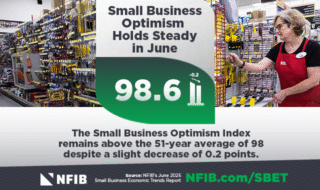January 2, 2024 Last Edit: July 21, 2024
The New York State Legislature passed 896 bills in the 2023 legislative session. Close to 300 of these bills were delivered to the Governor for her approval or veto in the final two months of 2023, including legislation that NFIB was actively engaged on throughout the entire legislative process.
The New York State Legislature passed 896 bills in the 2023 legislative session. Close to 300 of these bills were delivered to the Governor for her approval or veto in the final two months of 2023, including legislation that NFIB was actively engaged on throughout the entire legislative process. NFIB faced hard-fought battles at the end of the year, but we were able to secure the following vetoes and amendments to protect small businesses from added unnecessary costs and burdens:
Wrongful Death:
This bill would have expanded the categories of damages a plaintiff may recover in a wrongful death lawsuit. An actuarial analysis conducted by Milliman, Inc., found that medical professional liability, automobile liability, and general liability insurance would increase by as much as $2.2 billion. This rise in insurance costs translates to a 12.6% increase in annual premiums for New York State residents and businesses. The Governor vetoed this bill in 2022 over concerns about the cost impact; however, she was under immense pressure from trial lawyers, labor unions, and other organizations to sign the bill. Overcoming substantial support for the bill, NFIB secured the Governor’s veto again this year.
Equal Employment Opportunity Reporting Requirements:
NFIB strongly opposed this legislation which would have required certain companies and corporations to report certain data about the gender, race, and ethnicity of their employees. Currently, private sector employers with one hundred or more employees, subject to Title VII, and certain federal contractors with fifty or more employees, must submit an Equal Employment Opportunity-1 form (EEO-1) that includes information disclosing demographic workforce data, data by race/ethnicity, sex, and job categories, to the federal government on an annual basis. This legislation would require employers to report the EEO-1 information to the New York State Secretary of State for publication on the Secretary’s official website. This is an unnecessary additional reporting requirement and a hassle for no reason. NFIB urged the Governor to veto the bill, which she did citing our concerns.
Consent to Jurisdiction:
This legislation would have forced all companies registered to do business in New York to be subject to the “general jurisdiction” of the state’s courts. This means that lawsuits could be filed in New York courts by non-residents even if the underlying matter is unrelated to activity that happened within the state’s borders. This would have attracted lawyers and plaintiffs from all over to sue in our state courts over incidents that happened elsewhere in the world. Enacting this bill would codify New York’s reputation as the lawsuit capital of the world, transforming the Empire State into the world’s courtroom – clogging up our already overburdened courts. The Governor vetoed this bill in 2022, and at NFIB’s urging, vetoed the bill again at the end of 2023.
LLC Transparency Act:
The LLC Transparency Act requires the disclosure of the beneficial owners of a limited liability company (LLC) in New York. This legislation would have also established a searchable public database containing the names of beneficial owners of LLCs. NFIB strongly urged the Governor to veto this bill, specifically because of the potential implications of disclosing this information to the public. While the Governor ultimately approved this legislation, NFIB was successful in eliminating the public database portion.
In 2024, we will continue our advocacy efforts in protecting and defending small businesses across New York State.
Wrongful Death:
This bill would have expanded the categories of damages a plaintiff may recover in a wrongful death lawsuit. An actuarial analysis conducted by Milliman, Inc., found that medical professional liability, automobile liability, and general liability insurance would increase by as much as $2.2 billion. This rise in insurance costs translates to a 12.6% increase in annual premiums for New York State residents and businesses. The Governor vetoed this bill in 2022 over concerns about the cost impact; however, she was under immense pressure from trial lawyers, labor unions, and other organizations to sign the bill. Overcoming substantial support for the bill, NFIB secured the Governor’s veto again this year.
Equal Employment Opportunity Reporting Requirements:
NFIB strongly opposed this legislation which would have required certain companies and corporations to report certain data about the gender, race, and ethnicity of their employees. Currently, private sector employers with one hundred or more employees, subject to Title VII, and certain federal contractors with fifty or more employees, must submit an Equal Employment Opportunity-1 form (EEO-1) that includes information disclosing demographic workforce data, data by race/ethnicity, sex, and job categories, to the federal government on an annual basis. This legislation would require employers to report the EEO-1 information to the New York State Secretary of State for publication on the Secretary’s official website. This is an unnecessary additional reporting requirement and a hassle for no reason. NFIB urged the Governor to veto the bill, which she did citing our concerns.
Consent to Jurisdiction:
This legislation would have forced all companies registered to do business in New York to be subject to the “general jurisdiction” of the state’s courts. This means that lawsuits could be filed in New York courts by non-residents even if the underlying matter is unrelated to activity that happened within the state’s borders. This would have attracted lawyers and plaintiffs from all over to sue in our state courts over incidents that happened elsewhere in the world. Enacting this bill would codify New York’s reputation as the lawsuit capital of the world, transforming the Empire State into the world’s courtroom – clogging up our already overburdened courts. The Governor vetoed this bill in 2022, and at NFIB’s urging, vetoed the bill again at the end of 2023.
LLC Transparency Act:
The LLC Transparency Act requires the disclosure of the beneficial owners of a limited liability company (LLC) in New York. This legislation would have also established a searchable public database containing the names of beneficial owners of LLCs. NFIB strongly urged the Governor to veto this bill, specifically because of the potential implications of disclosing this information to the public. While the Governor ultimately approved this legislation, NFIB was successful in eliminating the public database portion.
In 2024, we will continue our advocacy efforts in protecting and defending small businesses across New York State.
NFIB is a member-driven organization advocating on behalf of small and independent businesses nationwide.
Related Articles














